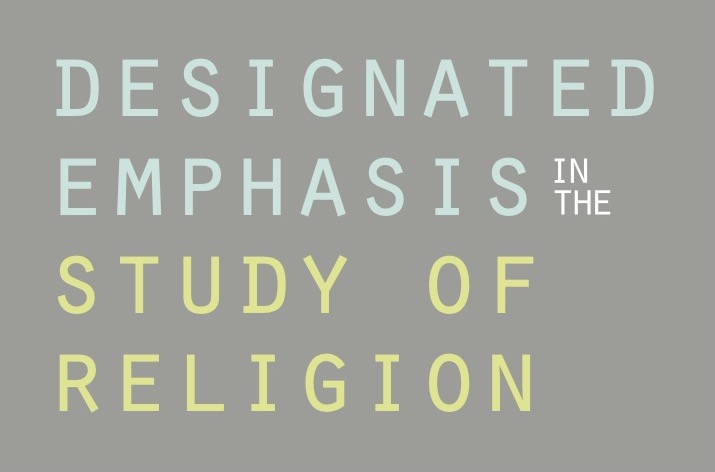 Applications for the Designated Emphasis in the Study of Religion are now accepted on a rolling basis.
Applications for the Designated Emphasis in the Study of Religion are now accepted on a rolling basis.
The Designated Emphasis in the Study of Religion (DESR) supports graduate training in Religious Studies and in the Theory of the Study of Religion, promotes graduate research on topics related to religion, and brings together a cross-disciplinary faculty Group in the Study of Religion.
Recognizing that many Berkeley students across the Humanities and Social Sciences are already deeply engaged in the study of religious phenomena, the DESR creates a space where those students may come together and focus on the history and theory of how others have approached such phenomena. Since Berkeley currently has no department of Religious Studies, the DESR also integrates professional approaches derived from Theology and Religious Studies, alongside those derived from other cultural traditions and critical approaches to religion.
The DESR’s two core-course requirements are Methods in the Study of Religion (STRELIG 200) and the Histories of the Study of Religion (STRELIG 201). In addition to two core courses, the DESR requires students to take one elective course. As with the core courses, various elective courses are offered each semester by faculty in departments across the Humanities and Social Sciences.
DESR ADMISSIONS AND REQUIREMENTS
Eligibility
Only students enrolled in PhD programs at the University of California, Berkeley are eligible to apply for the DESR. Except under exceptional circumstances, students are required to fulfill the requirements of the DE before taking the Qualifying Examination.
Application Process
Applications for 2023–2024 are accepted on a rolling basis. Please submit:
Please submit applications and supporting materials via email to info.bcsr@berkeley.edu.
Please provide the following items:
- The completed Petition for Admission to the DESR form (download here)
- A statement of intent (500-1000 words) describing how religion relates to your dissertation project or research interests
- A recommendation form (download here) sent from a faculty member preferably in your home department (potentially an adviser) under separate cover
Representation on Doctoral Committees
To qualify for the Designated Emphasis, the student must have on the Qualifying Examination committee a representative of the DESR. One of the members of the student’s dissertation committee must represent the DESR and be a member of the DE’s designated faculty. These faculty members may be outside or inside members of the student’s committees.
Degree Designation
Upon successful completion of the dissertation, the student’s transcript will include the designation: “PhD in [major] with a Designated Emphasis in the Study of Religion.” This designation certifies that they have participated in, and successfully completed, a Designated Emphasis in the Study of Religion in addition to all departmental requirements for the doctorate.
Forms for Current Students
DE in Study of Religion Requirements Checklist
Please download and fill out this form upon completing all required coursework and paperwork for the obtainment of the Designated Emphasis in the Study of Religion.
Petition for DE in Study of Religion Credit
Please use this form to petition for course credit in the DE for any course that was not explicitly offered as a specific Study of Religion requirement.
COURSE REQUIREMENTS
DESR students are required to take three courses. Two of these comprise the core curriculum, and one is an elective selected from a list of courses offered by the DESR faculty.
STRELIG 200: Methods in the Study of Religion
Methods in the Study of Religion is an introduction to methodological best practices in the Study of Religion from the perspectives of different fields. It is made up of multiple modules that combine the study of primary sources with exemplary methodological approaches. These approaches include but are not limited to: anthropological theories of religion and society, historical genealogies of categories of religion and the secular, theology and Church history, sociological approaches to issues like religious organization and conflict, religion and science, religious literature and Biblical hermeneutics, as well as particular religious histories.
STRELIG 201: Histories of the Study of Religion
Histories of the Study of Religion is an introduction to the history and development of the field of “Religious Studies” as an intellectual space for the study of a sometimes historicized, sometimes naturalized phenomenon called “religion.” Since the narration of any history of the study of religion serves to circumscribing a particular set of phenomena as “religious,” this course does not isolate a canonical history of the field. Instead, it progresses in roughly diachronic manner, through a number of thematic threads representing the development of different domains of the study of religion.
Elective
Additionally, students must complete one elective course from a list of pre-approved graduate courses on religion. In some instances, students may petition for other, relevant courses to be counted towards their elective requirement. If a course is offered for variable units, students must enroll at the maximum possible unit value. Potential elective courses will vary depending on faculty teaching plans in a given semester.
Please see the “Courses” page for more information.
